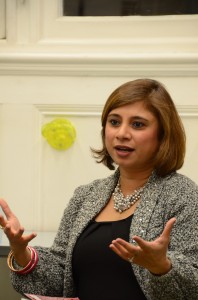In late November when my husband, Anudit, and I were attending a relative’s memorial service, I kept thinking about how little we know people. Our understanding of fellow human beings is often based on what we have in common or the relationship we share with them. My husband’s great aunt, in whose honour the memorial service had been organized, we all loved her. But all of us who got together that day remembered her as an avid reader, undefeatable Scrabble-player, crotchet-Queen, good cook etc. All the loving, doting qualities grandchildren appreciate in their grandparents. But it was her friends present at the service, who told us how she was a yoga-practitioner, problem-solver for all generations, chairperson of the Hindi literary society and had so many facets to her that we never associated with her. Needless to say, we were all in awe.
Sometimes in life, all you need is perspective from a stranger.
After the ceremony, as the family shared stories, smiles, laughter, and food, a part of me faded away. Don’t get me wrong; I love the family, the warmth they bring into our lives, and every second we spent with them at the service. But the writer in me has a compulsive habit of dissociating with my environment every now and then to nourish the antsy storyteller itching for a story. It’s often the case with the creative minds—there is restlessness, urgency, and inability to close off.
A single thought haunted me: people aren’t always who we think they are. As I repeated it, I felt a sense of déjà vu. It dawned onto me that it was exactly three and a half months ago my husband and I had made a trip to Washington DC when one of my poems from No Ocean Here, was selected by Artworks for Freedom for a campaign to fight human trafficking and modern day slavery. The founder of the organisation had invited me to share my work at the fundraiser. Listening to stories of women who had survived rape, assault, stabbing, shooting and other heinous crimes and made something out of their lives, reminded me that when people want to do something, they somehow manage to do so. Not only did these women do what they had to do to survive but they actively did what they could to help those in need. You couldn’t tell from the way they handled themselves how difficult their journey must have been. What we see in people isn’t the only way to see them. There are so many stories, which we don’t want to know or have been previously oblivious to – or have deliberately not been told.

Sometimes in life, all you need is perspective from a stranger.
That trip in August was a step towards how I was going to change my life going forward, something I didn’t even realise at the time. After the fundraiser I made a mental checklist of people I interacted with most—both offline and online. Writing can be a lonely and isolated job and so many of us overcompensate this, by spending time online, in the illusion of company. We interact and become friends with some incredible people across the globe, we also put ourselves at risk by sharing our time and lives with disingenuous people.
Writing can be emotionally exhausting. It’s physically draining. And if you’re a freelance writer like me, there is that self-imposed pressure and in-built guilt to never turn away any opportunity because that means losing a pay cheque. So you work and work and work and burn the candle at both ends until you lose sense of the real you. While I love what I do, I have also come to understand that during the process of creativity, as writers, our skin becomes thin. We are vulnerable when we create and what the world sees and hears is not the real us. This phase is scary because we are at our lowest as artists and parasites of society can let themselves in without us even realising. That is why it is incumbent upon ourselves to make sure we have good, reliable people surrounding us at all times. None of us are infallible.
Like many other authors, I mentor aspiring writers. Part of that mentor role means devoting time to foster a meaningful relationship. I feel humbled that I am in a place where I can give back to society in terms of my creative services, so I offer it without any expectations (sans hard work and discipline) or fee because the world needs more artists and writers. Also, writing can be un-grounding, so I’m happy to be there as a stable support and help form a feeling of a community—something I didn’t have when I started out.
Mentoring has been an interesting journey. It has introduced me to a variety of people and made me realise that generally people fall under two categories: 1) Hardworking, determined professionals, who want to make a difference in the world and are committed to their ambition. They are grateful beings and only too willing to do what they can to make stuff happen. They don’t use personal or professional excuses to victimize themselves; 2) Narcissistic, self-centred, manipulative, insecure, ungrateful folks who can neither rejoice in anyone’s happiness or success fall into this group. They blame the world for their failures and want to reach the top using unscrupulous methods and minimal effort.
I began to realise that those who fell into this second group were only to happy to abuse the mentor-mentee relationship in several ways. Given that I love social media I was always available online. But some assumed I had all this extra time, so they came in bearing a sense of entitlement. The minute they felt my attention was diverted, tantrums began, which included childish, attention-seeking strategies to make sure I didn’t “forget” about them.
Before that trip to Washington DC, I never once paused to think who I was letting into my life. I’m a friendly person and use my over-empathetic heart to make decisions. I have a soft spot for victims and those in need. If someone says they need help and are in a bad place, I am there for them. It is easier to believe someone than disbelieve. It is a lot more effective to extend help than bargain for reason with those being unreasonable. I didn’t for once think that there are sociopaths who choose to victimize themselves just so they can find a place in your life.
I know that my method isn’t the smartest way to live in today’s world. A few of my friends shook me up and said, “You need to disconnect with the emotional vampires in your life.” I was losing weight and sleep. And slowly my health too had started to betray me. People started to notice that I looked pale and drained and that I needed to step away. I went from one thing to the next without stopping for breath. I failed to realise how badly I needed a break from working non-stop, how important it was to pause and take a stock of my life, to reflect.
A big part of my downtime includes spending time with people who are important to me and cooking for them. Reconnecting with my non-writer, logical side. Taking notes. Writing tidbits. Absorbing my environment without deadlines in mind. I’m learning that it is necessary for writers and poets to pause and shed a layer of skin between projects. Finding hobbies or things-to-do that make us happy and fulfilled, always help with the recovery. They nourish the soul, pamper the heart, and repair the brain. By refusing to take a break, we only open ourselves to a slippery slope. Pausing for breath doesn’t lead to disconnect from your creative soul; if anything, it enriches your inner artist, giving you a renewed sense of vigour to tackle your next project.
Sweta Srivastava Vikram is an award-winning poet, writer, novelist, author, essayist, columnist, and educator. She is the author of five chapbooks of poetry, two collaborative collections of poetry, a novel, and a nonfiction book. She also has two upcoming book-length collections of poetry in 2014. Her work has also appeared in several anthologies, literary journals, and online publications across seven countries in three continents. Sweta has won three Pushcart Prize nominations, Queens Council on the Arts Grant, an International Poetry Award, Best of the Net Nomination, Nomination for Asian American Members’ Choice Awards 2011, and writing fellowships. A graduate of Columbia University, she lives in New York City with her husband and teaches creative writing across the globe & gives talks on gender studies. You can follow her on Twitter (@ssvik) or Facebook (http://www.facebook.com/Words.By.Sweta). You can read more on her website www.swetavikram.com

